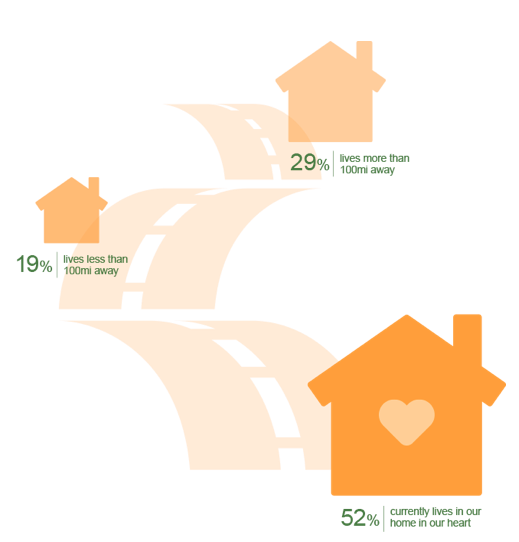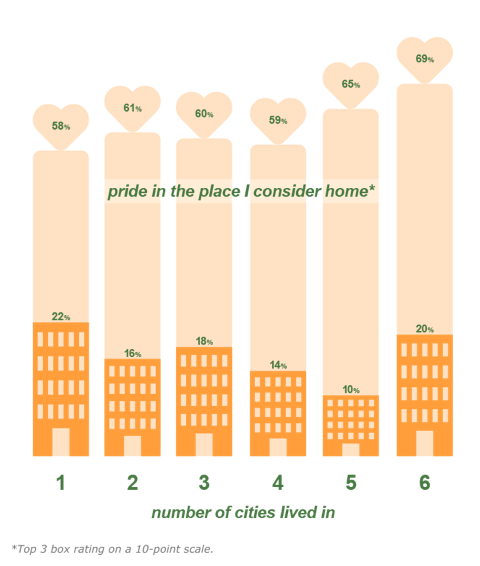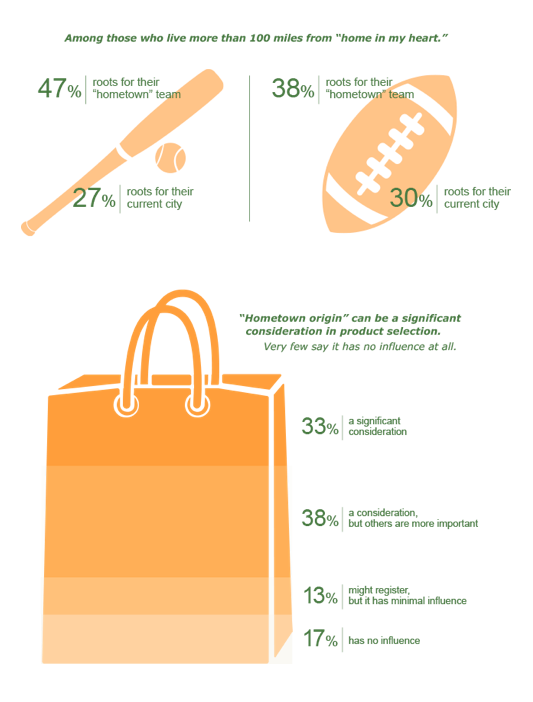ConneCKtions Research: What does “home” mean to your customers?
By Dave Brazier and Lisa Rios
Many of us traveled this holiday season. In fact, the American Automobile Association predicted more than 46 million Americans traveled 50 miles or more in 2015 to celebrate Thanksgiving with friends and family and 2015 holiday travel (Dec. 23 – Jan. 3) numbers were expected to hit a record-breaking 100 million. With so many of us living across the country for career growth or family reasons, what do we consider our emotional “home” to be? And what effect, if any, does that have on our pride of association, the teams we support and the products we buy?
To answer our questions, we polled a few Americans (1,025, to be exact) about the place they consider home in their hearts.
Where (and what) is home?
The first thing we learned is that “home” is not necessarily the place where we currently live. In fact, nearly one third of Americans live more than 100 miles away from the place we call home in our hearts.

How attached are we to the home in our hearts?
The short answer: It varies.
Nearly 80% of US adults have lived in more than one city. In general, we’re quite proud of the place we think of as home. But interestingly, those who have moved more are even prouder of that place. It may be that frequent moving builds a sense of nostalgia; or perhaps it prevents us from planting emotional roots in our new hometowns (or both).

How strong is our affinity to our hometown teams?
At C-K’s Milwaukee office, in particular, we encourage employees to wear their team jerseys on Fridays during the Fall. Of course, the idea is to support the Green & Gold… and only a Packers jersey qualifies an employee to appear in the weekly group photo. Still, many brave souls among us wear team jerseys representing cities like Chicago, Pittsburgh and San Francisco.
We saw the same thing in our survey: When Americans move away from our hometowns, we’re likely to carry our team allegiances with us. Adults who currently who live more than 100 miles from the place they call “home in their hearts,” are more likely to root for their “hometown” team than they are to root for the team that represents their current city.
Of note to us, 100+-mile movers in our survey seemed to have stronger connections to their “hometown” MLB teams than their “hometown” NFL teams. Brand Keys, a research firm that tracks fan loyalty across professional sports leagues, currently lists the NFL as the league with the strongest fan loyalty, followed by the MLB. (However, the leagues have traded places over the past several years depending on league dynamics and current events – and it’s worth noting that our survey fielded in early October, amid the buzz of the World Series.)

It seems our wallets also have allegiance to our hometowns: A third of consumers say that “hometown origin” can be a significant consideration in product selection. Only 17% say it has no influence on their purchases.
What does this mean for marketers?
Home is where the heart is.
Despite out highly mobile, digitally linked world, home remains a deep emotional wellspring for most people, offering strong potential for brand connections.
That said, just being local won’t win everybody’s love.
Don’t assume your localized messaging has the same impact across your entire customer base. Remember, “local” is a geographic concept; “home” is an emotional one.
On the other hand, being a true “hometown brand” can help cultivate brand authenticity.
While some of your customer base (those who are “not from around here”) may not readily understand the local quirks and character of your home-based brand, they will acknowledge it as genuine, providing a rich, engaging and meaningful brand narrative.
Source: A custom survey of 1,025 U.S. men and women age 18-64+. Surveys were completed October 6-7, 2015.
More Insights
- December 3, 2015 Black Friday and emojis on Twitter and Instagram.
- November 18, 2015 Social data can really light up a room.
- November 17, 2015 At Social Media Week in Chicago we talked about SEO in 2015 and what to expect in 2016.
